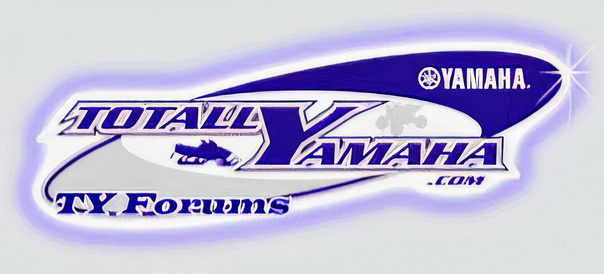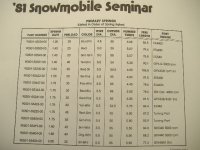dws743
Member
I bought a 1990 PZ ll le and the clutch engages at 4200 rpm. The service manual says it should be 3200 rpm, so I assumed it has been re-tuned-it does not appear to have been, however.
Green/yellow spring, 87F weights.
No shims, no modifications that I can see and the clutch and all components appear to be in excellent condition and working as designed.
Anyone have any pertinent knowledge on this?
Green/yellow spring, 87F weights.
No shims, no modifications that I can see and the clutch and all components appear to be in excellent condition and working as designed.
Anyone have any pertinent knowledge on this?

I bought a 1990 PZ ll le and the clutch engages at 4200 rpm. The service manual says it should be 3200 rpm, so I assumed it has been re-tuned-it does not appear to have been, however.
Green/yellow spring, 87F weights.
No shims, no modifications that I can see and the clutch and all components appear to be in excellent condition and working as designed.
Anyone have any pertinent knowledge on this?
New belt?
x2 on the belt .
dws743
Member
The belt doesn't have anything to do with when the clutch starts engaging...
it does if it is worn out. as they wear thinner, you need more rpm to make the clutch engage.
dws743
Member
The clutch engages without a belt even on it.
Just go away..
Just go away..
BornYamaha
Member
This is no normal forum. The people you just told to go away are very knowledgeable and are only trying to help as they do with everyone. 1000 rpm above stock may be a bit much to raise the rpm from just a worn belt, but you would be surprised how much difference it can make. It was a reasonable question. By the way, I owned a "90" Phazer II for 16 years from new and spent countless hours exploring different clutching combinations. It was heavily modded. I may have actually just figured this out. Look at the fourth line on the attached old spring list. It shows a Yellow/Green spring that has values that would put your engagement in the area that you are listing. Leave it to Yamaha to have two similarly colored springs with different values that will fit in the same clutch. It may have gotten in there by accident or on purpose. I used these older springs in my Phazer all the time. What is your shift rpm? If it is the older spring I would expect it to be higher than you would want as well unless someone has compensated in another way. If the shift rpm is correct that 4200 rpm engagement should make that sled take off pretty good. Unless this is to be used by a mellow rider or a beginner you may want to leave it the way it is if the shift rpm is in the right ballpark. Try to locate another primary spring with the same or similar values if you want to be sure.
Attachments
NorthofSixty
Active member
Engagement rpm is the rpm at which the clutch engages the belt and the track starts to move. Never run the clutches to engagement rpm without a belt. Could be a combination of things. Worn belt in combination with wrong centre to centre distance will drive up engagement rpm. I had the opposite problem on a 99 SXR engaging way too low. First thought it was the spring but turned out that the centre to centre was out by more than 1/4” from max spec. Also make sure the clutch is clean, operating smoothy and bushings and guides are not worn badly.
Last edited:
dws743
Member
When I say engagement rpm, I'm talking about the rpm at which the sliding sheave starts to move...
Can a moderator please delete this thread? Thank you.
Can a moderator please delete this thread? Thank you.

When I say engagement rpm, I'm talking about the rpm at which the sliding sheave starts to move...
Can a moderator please delete this thread? Thank you.
So now that you have been clear on the question are you sure you want this removed?
I am of the opinion that the belt has no effect on when the sliding sheave starts to move, and/or engagement, but it's important to keep the threads civil and respectful even if the are disagreements. 




